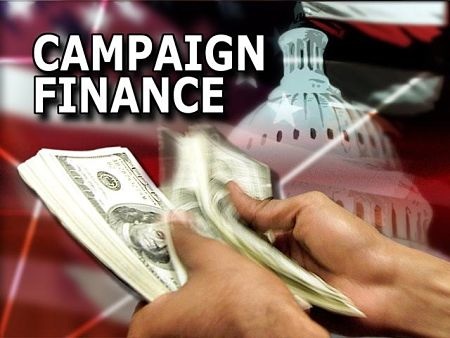Measure By Measure: Tuesday's Ballot Initiatives
Comments (1)

If approved, Prop. 15 would repeal California's ban on the public financing of
campaigns through a pilot program. (Creative Commons)
Five propositions that mostly deal with elections and big business have qualified for Tuesday's ballot.
Here's a closer look at each initiative:
Proposition 13: Seismic Retrofitting
If approved, would prohibit tax assessors from re-evaluating new construction for property tax purposes if the property had been altered for seismic retrofitting.
Arguments For: Supports and offers incentives for earthquake safety.
Arguments Against: Though no formal opposition has been submitted to the state's official voter guide, the Alameda County Green Party has openly said they don't trust its backer, Republican State Senator Ray Ashburn.
Proposition 14:
If approved, would require all candidates to run in a single primary open to all registered voters. The top two vote-getters would then face off, regardless of party affiliation. This new system would go into effect in 2012. Additionally, it prohibits political parties from nominating candidates, though they would be allowed to support, endorse or oppose them.
Prop. 14 could radically change the way candidates campaign as they would no longer be appealing to just one party, instead they would have to appeal to both sides in order to win the most votes.
Arguments For: Proponents believe the effect of this kind of campaigning could make candidates more moderate and better able to work together in the legislature forming compromises between the two parties that have seen historical success.
Arguments Against: Naysayers believe this proposition could remove the political party system altogether and question whether more moderate legislators are the solution to Sacramento's problems.
Gordon Stables, an expert in political communication and a clinical assistant professor of communication at the Annenberg School for Communication and Journalism, told Neon Tommy that opponents of Prop. 14 believe this new system would result in additional spending as candidates would "have to run two full races."
Proposition 15:
If approved, repeals California's ban on the public financing of campaigns and would create a voluntary system (like that of the presidency) for Secretary of State candidates in 2014 and 2018 to have their campaigns publicly funded with grants if they meet certain qualifications.
Considered a "pilot program" as it would only apply to the office of the Secretary of State in those two election seasons. It would then have to be re-authorized.
Arguments For: Proponents say it will even out the competition among candidates. In a Q and A with Neon Tommy in March, Dr. Trent Lange, head of the pro-Proposition 15 campaign, said, "The fundraising game takes away from the important issues....Public financing makes sure there are candidates that represent the interests and needs of voters who aren't wealthy or don't have wealthy donors."
Arguments Against: Opponents believe it may lead to "moving toward public funding for all races because it opens the door to future experiments," Stables said.
The Whitman effect: "We are seeing what can happen right now with Meg Whitman spending millions in the race for governor. This will not be the last time that you see measures attempting to limit campaign financing in California. Election campaigns are becoming too expensive," Stables said. 

Proposition 16:
If approved, would require two-thirds voter approval before a public agency could enter the local retail power business.
Having contributed upward of $40 million as of late May, Pacific Gas & Electric (PG&E) is the main financial sponsor of the proposition.
Arguments For: Proponents argue that it gives the public a larger say and a "financial safeguard" to control government spending. The PG&E ad campaigns have titled the proposition the "Taxpayers Right to Vote."
Arguments Against: Opponents believe Prop. 16 is PG&E's way of "winning a guaranteed monopoly" in the state and are calling the measure the "very definition of special-interest lawmaking."
Proposition 17:
If approved, gives California insurance companies the right to offer "persistency discounts" to automobile customers who have a history of insurance coverage.
It attempts to scale back what was set into place by voters more than 20 years ago under Prop. 103. The 1988 measure required insurance companies to set premiums and rates based on a driver's record, history and patterns, which included the number of miles driven annually and the driver's safety record.
Having contributed upward of $14 million (98 percent of the funding) for the "Yes on 17" campaign, Mercury Insurance is the proposition's primary financial sponsor.
Arguments For: Proponents believe this measure offers drivers an incentive to remain insured.
Arguments Against: Opponents argue this measure, which has been called a "special interest scam" could negatively impact low-income drivers who have had gaps in their insurance coverage by charging them large surcharges and premiums.



